- Home
- Anne Spackman
The Empire: Book Six of Seeds of a Fallen Empire Page 10
The Empire: Book Six of Seeds of a Fallen Empire Read online
Page 10
So, the mind transferal operation procedure had failed.
Hinev couldn’t do it. Hinev had failed.
Ornenkai would never be able to transfer his soul back into his original human body, unless he was willing to die in it, because Hinev couldn’t restore it or alter it with Hinev’s serum, any more than he could transfer the mechanized Elders into a body that had already been altered by the serum.
Ornenkai knew what this meant. Ornenkai’s greatest hope, a hope he had dared to believe possible since he learned of Hinev’s serum, had been dashed to nothing, yet he took the news rather well. When Ornenkai discovered that Hinev’s serum had only worked on thirty-one candidates Hinev had grown for the Elders, and that there was simply no way of transferring the Elders’ minds into the successful candidates of Hinev’s explorers, Ornenkai very nearly lost his temper. He very nearly gave in to a fit of madness and anger. He very nearly gave in to despair, not a heart-numbing despair but a kind of rabid anger that he knew would destroy his soul.
Yet in the end, Ornenkai lacked the courage to lose his own sanity and surrender to his fury. He returned to his senses, became again cold and hard and reasonable.
Ornenkai had come to know great emotions, but he was also a man of reason, and knew that if he was patient, perhaps one day Hinev would perfect the immortal clones that Ornenkai and Marankeil required to be humanoid once more.
When the news about the failed transfers of their minds into the minds of the explorers at last set in, Ornenkai realized that in a strange way, he had been glad to learn that Marankeil couldn’t take Kiel’s body for himself to become the new home of his soul and mind’s memories. Yet now Hinev was telling him that even transfers into immortal clones were impossible? Hinev was giving him some nonsense about the serum not working on clones who had been grown without pre-existing memories.
Ornenkai didn’t like to believe that Hinev was lying.
At the same time, according to Hinev, more than a hundred real people who had undergone the serum transfusions, men and women with real memories had been destroyed by the serum; a few had even gone mad like wild animals and escaped. Ornenkai took this news almost as well as the first. Despite what Hinev said, Ornenkai refused to allow that Hinev was unequivocally correct about what could and could not be done. Hadn’t the first two serum experiments failed before Hinev was able to perfect it and achieve the metamorphosis? Hinev was just going to have to try again. In the mean time, Ornenkai knew that he could wait, perhaps as much as ten thousand years, as long as Hinev eventually found a way to grant him immortality in a physical human body.
However, at the moment, Hinev could only create identical clones from the Elders’ original bodies, modified to age slowly, to last perhaps a thousand years—then their memories could be “channeled” as it were, into the Main Terminus for storage with the Elders’ original memories. Giving them new clone bodies once more was the best Hinev could offer them, and though Marankeil and Ornenkai had accepted the temporary transfer into clone bodies, they would accept the transfer only as a temporary measure.
Ornenkai felt the full weight of Hinev’s failure as he left Hinev at his laboratory. The two of them had spent a significant amount of time setting up equipment for the temporary transfers in the underground chambers of the nearby Main Terminus, where Ornenkai and Marankeil’s original bodies had been stored, and where their memories were linked to a permanent storage unit in the Council of Elders. Now that Ornenkai understood Hinev’s transfer process and had been prepared for what was to happen, he had a few errands to finish before the transfer could begin.
The process of Ornenkai’s mind’s memory transfer into a new clone body from the mechanized unit was going to take several years, ‘downloading’ as it were, information, and though Ornenkai would be able to interact with the world through his position in the Main Terminus, his mechanized unit wouldn’t be able to travel freely until the transfer was successfully completed. Marankeil had already been informed of Ornenkai’s impending experimental transfer and planned to wait until Ornenkai’s new transfer was a success before following suit.
In the meantime, Ornenkai had news to deliver to Ungarn, news from Marankeil himself that Lieutenant Alessia Enassa, who had gone to train under Ungarn, was to be transferred to the Selesta to become one of Hinev’s explorers.
Ornenkai tried hard not to become worked up by thoughts of the explorers’ impending mission. Without an immortal body, Ornenkai had accepted that he wouldn’t be able to join the explorers, even if he had been able to sacrifice all his obligations to accompany them into space, as he had long dreamed of doing, albeit secretly, ever since he began work on Selesta.
As angry as Ornenkai was by the news that Alessia was to become an explorer, Ornenkai could guess why Alessia was being sent away. Marankeil didn’t want Alessia anywhere near him. For some strange reason, Marankeil feared Alessia could and would harm the mechanized Elders in some way. Marankeil didn’t want her near Hinev, either. Ornenkai also perceived the reason for that; Alessia was the only one who might be able to interfere with Marankeil’s control over Hinev. And, as long as she could be kept away from her mentor-father, she could be used as a powerful bargaining tool to keep the rebellious scientist under control, to keep him working for Marankeil.
Alessia was soon to disappear far out of Ornenkai’s reach, perhaps forever.
He was trying not to let this affect his mind and emotional state when he ran into her suddenly in the corridors of the Ariyalsynai Scientific Center.
He didn’t even try to avoid her when he saw her coming towards him. He had met her several times since she had grown into a woman and received Hinev’s serum, but every time he saw her, the sight of her had a profound affect upon him; the force of her presence never failed to subdue his heart.
She was as wild and untamable as ever, as irreverent and free, hot-headed and willful; being near her had an intoxicating affect upon him. He savored every moment, aware that she would soon grow restive and dismiss herself after a moment’s conversation, eager to be away from him. Since she was a child, she had casually dismissed him, even when he attempted to be kind, even though he was always kind to her. Did she imagine that the great Ornenkai was merely kind and oncular, impotent and ineffective, sentimental perhaps? Did she imagine he was someone that allowed others to criticize him so harshly, to make light of his words, to sneer at his momentary display of affection and thoughtfulness?
He was Elder Ornenkai and tolerated no defiance from anyone else in all of the Federation.
Yet he never let her irreverence pain him, because he knew why she despised the Elders. They had taken her from her home. Yes, he could understand her hostility. And he had never let her pain him because she was the only one who had ever so defied him in more than three thousand years. It never ceased to amaze him that she wasn’t afraid of him, of Marankeil, of anyone. Only situations intimidated her; people, she disregarded, maybe even foolishly. And Ornenkai couldn’t help but wonder if she would always be so aloof.
Didn’t her cruelty affect him? he sometimes thought to ask himself.
Ornenkai told himself it did not, but that was only because she never registered his feelings for Alessia. Her complete and utter ignorance of his adoration was the one thing that kept her cruel and indifferent behavior from doing any true damage to him; if she ever suspected his feelings, could he still be so careless and open about showing them? Could he risk her using his feelings against him to gain power and control over him? Perhaps that was why he was able to be so kind to her, so completely understanding of her; she didn’t desire power, power over him, because she was so supremely in control of her own self, so perfectly content in her own self, so unconcerned about what other people were doing that she never thought to control anyone else. She could not imagine that a machine man had any human feelings of any kind, much less harbored feelings for her.
Even now, even since Ales
sia had become a woman, she still didn’t know that he desired her deep down, in that part of his memory that knew what it was to be a human man and wished to be one again. But he desired more than her body, he desired her company and her soul, and most of all he desired her approval, if he had admitted it to himself.
She was intellectually brilliant, but for all her intelligence, she couldn’t see past the one particular prejudice she had. Recently, however, she had begun to act more kindly towards him as her mind matured and she sensed that his kindness was genuine, as she began to understand that she should be sensitive to such kindnesses and return them with polite consideration.
Ornenkai felt gratified that she had grudgingly begun to see him as a friend, in spite of her own prejudices. He often wondered what she would have thought of him, though, if she knew what he was thinking when he looked at her. And that he had begun to wonder—could she be subdued and won over to his side?
He refused to believe that it was possible, to imagine that it could be done by any other than him.
Every time he saw her, the thought struck him that he had never actually touched her. He began to fixate upon her hair and skin, and was at all times aware of exactly how far away she stood from him when they met.
He had sworn he would never touch her until he became a man once more, and then—then he would reveal his nature to her, his every thought and feeling, his memories and past—but now, as he looked at her, he knew for the first time that she was only a dream to him now, because he would never have her, not if things remained as they were.
She was going away, perhaps forever. She was to be one of Hinev’s explorers.
They stopped in the corridor; she started talking about something, but he missed the words, focusing only on her beautiful face, the curve of her shoulders, the poise of her neck, the long, wild, silky hair she refused to style in any way, that arced so lovingly over her breasts.
Finally, she began asking him questions about Hinev and his serum candidates; Ornenkai told her that the explorers were being sent out to Lake Firien to complete their training before the explorer mission could be launched.
As he answered her questions, a part of his mind faced the horror that she was the one creature in all the world that he looked forward to seeing, that he sought out and enjoyed meeting. What would the world be like without her presence in it? He would be alone when she left.
“Is something wrong, Elder Ornenkai?” she asked, her lovely brows drawing together in concern.
"Too many things that I will not burden you with, my dear," he responded, feeding hungrily upon her momentary affection. "Disappointments mount like the fallen leaves, but a strong wind sweeps them all away," he added as quietly as a machine could, mumbling an age-old saying. Why was he forgetting himself? She would return, and by then, Hinev would find a way to grant him immortality in a human body. Ornenkai had only to be patient. Then, he would have what he wanted. Was he not the second most powerful man in all Seynorynael? In the entire Federation? Wouldn’t he be able to win Alessia’s heart one day?
Yes, he would, he thought. He had never failed at anything important before.
They talked for some time longer when Ornenkai remembered that he was going to deliver the news to Ungarn about Alessia’s new post. He left her as quickly as possible, before he contemplated thoughts of rebellion against Marankeil’s orders. Then gradually, his mind returned to bitter thoughts about Hinev.
Despite his reverence for the scientist, Ornenkai couldn’t deny that in some way, he was almost glad that Hinev was torturing himself with guilt over the failed serum candidates, and working like a madman to find a way to restore them back to life.
Hinev deserved to suffer for what he had done.
For all the suffering he had caused.
"I'm glad I found you, Kellar," Lierva said as she entered Selesta’s bridge.
Only two days before Hinev's explorers planned take-off, all of the others were in the lyra forest on board Selesta at the moment, working on installing an artificial weather circulator, where they had been going in and out for the past several days. Lierva had gone there to find Kiel to see if he could procure another hundred Valerian fighters from the Firien City defense center, but Kiel had been busy with his latest project, and she decided not to disturb him.
But thankfully, there were some things she could depend on, even though the ship's systems had been shut down to run the last systems' test and none of the ship-board locators were working. Gerryls was still in his laboratory, and he suggested that she look for Kellar on the bridge. Typical Gerryls, he’d been confused as to why she had not located Kellar either telepathically or on her wrist communicator and tried to telepathically weed out the secret.
She laughed, keeping up her mental barriers, and explained that she had kept it turned off so that no one might locate her and had used her power to keep her presence unknown; Gerryls at last understood.
Gerryls wasn't about to help Kiel either, Lierva knew, since he and Kiel had made a bet that Kiel wouldn't be finished with his weather circulator by the end of the day. Lierva admitted to herself that she had avoided being ‘seen’ by Kiel in part to avoid conscription. It was bad enough that nearly everyone else had been called in to the lyra forest they had brought on board Selesta to help him. But Lierva was glad she found Kellar on the bridge. If she had reached out to use her telepathic abilities to find him, Kiel would have found her in a heartbeat.
"Oh, Lierva, I'll be done in a second," Kellar said from the systems panel in the center of the bridge near the malfunction monitor. "I'm just installing the power re-routing system. Once this monitor is finished, it will link up with the engine and all of the ship's functions."
"Will all of the energy routes really prevent any power failures?" Lierva wondered, now curiously watching Kellar's final adjustments.
"Hope so," Kellar replied with a grin. "As soon as we engage the engine generators, anyway. There shouldn't ever be a power shortage as long as the generator is running since it runs on string energy.”
“Not much chance of it running out of power, then," she observed.
"What brings you here, by the way?" Kellar wondered.
"I just came to ask if you'd contact the defense center and get us another hundred fighters," she said, drawing a finger over the console of the nearby station.
"Why don't you ask yourself?" Kellar shook his head. "It’s not as though they won’t obey you. You have the authority to request anything you need from Firien City.”
“But I’m not in charge here, anymore,” she said after a moment.
Kellar shrugged. “You know, it still doesn't make sense to me why you didn't want to be in command or even second-in-command."
“You haven’t been in command long enough to understand.” She told him.
“No, I haven’t.” Kellar agreed. “That isn’t the entire reason, though, Lierva.”
“No.” She agreed. What could she say? Would he understand that she didn’t want any part of the responsibility anymore? That she didn’t want to have to be the one everyone, her subalterns, kept at a distance, that she didn’t want to have to worry about anyone else if she didn’t want to? She was tired of endless obligations, and of denying her own needs and wants for the common good. Did anyone know how much time it had taken her to recover from her love for Hinev?—no, because she wouldn’t let them know. She still loved him now, even though she had accepted the fact that he had been sent to Eneveh while the explorers went out on their mission.
Would she ever see him again?
Did it matter if she did? she asked herself, bitterly. Hinev hadn’t wanted her permanently in the end, and so at last, sensing this, she had been able to give up on him. Or at least that was what she was telling herself in order to function normally.
And Celekar, so quiet, so rugged and unfeeling, so hard-faced and unaffected—she
thought of all the things he had said to her over the years, warning her about plunging ahead into things, and felt ashamed.
Yet she, Lierva, had run after Hinev like a tame creature after its master.
Why hadn’t Hinev been able to love her?
Perhaps because he had no room for anyone in his life but his obsessions; oh yes, she had come to understand so much about human behavior in recent years that she no longer really held a grudge against him for being incapable of loving her, or any woman.
She no longer felt the sharp sting of pain when she saw the ancient holo-still sitting on a panel in his laboratory, a still of the woman who would always have his heart.
But she no longer had any desire to live for anyone else; she only wanted to be free, and Hinev had given her the means to achieve that freedom.
Hinev’s explorers were leaving Seynorynael on the spaceship Selesta; Lierva couldn’t get away from their home world quickly enough. She was going to the ends of the universe where the name of Hinev didn’t exist.
Why wouldn’t she stop thinking about him? Why couldn’t she hate him?
And why didn’t Celekar hate her, now that she knew how he felt about her?
Hinev’s serum hadn’t answered all of her questions; instead, it seemed to bring more of them to her attention. Infinitely more.
A transmission lit up the holo-monitor. Kellar stopped what he was doing, and both he and Lierva looked up at the projection sphere.
"This is Commander Ungarn. Greetings, Lieutenant Kellar."
"Greetings, Commander." Kellar suppressed a grin; Ungarn had the strangest effect of reducing Kellar to a youth again whenever he was around.
"Please relay this message to Lieutenant Kiel. I have new orders from the council to deliver another explorer to join your crew of Selesta. Lieutenant Alessia Enassa from Ariyalsynai is accompanying me to Firien City, and we will be arriving later this afternoon."
“Lieutenant Alessia Enassa?” Lierva echoed. The name sounded strange.
"Can you tell us anything about her, sir?" Kellar asked.
"She was Hinev's assistant for several years before joining the Martial Scientific Force, and has become one of the most valuable assets to my command." Ungarn said, letting a hint of approval come through. “Her file is in the computer, if you’d care to examine it.”
Lierva looked at the edge of the holo-monitor's filed, where a young woman sat looking out the window. Turning aside, she saw Kellar's smile, and cuffed him behind his ear. Kellar didn’t object; he seemed to enjoy the attention.
I thought Hinev's assistant was a half-race child, Lierva thought and shrugged.
"Why would Hinev send us another explorer—now of all times?" Kellar asked.
"I don’t question the council's orders," Ungarn said. "But Hinev told me that he already trained Alessia for the mission.”
“When?” Kellar wondered. This Alessia Enassa hadn’t ever made an appearance in their explorer training in Ariyalsynai.
Hadn’t there been a problem with the serum? Hadn’t that been what Hinev told them when Kiel asked if Calendra could receive the serum, knowing that its gifts would bolster her weak constitution, so that she could be an explorer, too?
If Hinev had been telling them the truth, then why had he given the serum to this Alessia Enassa and refused Calendra?
Kellar could see Lierva eyeing the girl with an expression of complete disapproval, but she didn’t seem surprised to see the girl standing there; she seemed, rather, to recognize her in some way.
“I don’t know.” Ungarn admitted. “Anyway, please deliver this message to Kiel, and I will present my report from the Council to him upon arrival." Ungarn said, and the transmission ended.
"Trained for the mission?" Kellar echoed. "Does that mean she was given Hinev’s serum?"
“I suppose.” Lierva said, distracted; Kellar looked hard at her, and he knew, he knew what was bothering her, but he didn’t let on. Alessia—Lierva already knew about her, and she was already inclined to dislike her.
Kellar knew why, of course; Alessia had something Lierva never felt she had managed to obtain: Hinev’s unconditional love.
And had no doubt Lierva would make Alessia suffer for it.
The morning of Selesta’s take-off, Kellar found Kiel standing on the bridge shortly before the others were to arrive; outside the viewport, the haunting quiet of the fields of Firien stretched away gold and green. On the bridge, the couldn’t hear the winds sweeping over the golden attorea flowers and over the grasses undulating like ocean waves; they couldn’t hear the sound of the ceiras birds circling over Lake Firien, beyond the range of sight on the port side of the new explorer spaceship.
“Hey Kiel, what are you thinking about?” Kellar asked, watching him several moments; Kiel had yet to turn around and stood, staring at the land outside, at Firien where they had lived so many years.
“A friend I knew, long ago.” Kiel said after a moment.
“A friend? Man or woman?” Kellar said, stepping beside him. His eye found a yilechi running over the field before them; he followed it until it was out of sight.
“My first instructor. His name was Jinderian.” Kiel replied.
“Who was he?”
“Who was he?” Kiel echoed.
“You said he was an instructor, but that’s not all he was. What did he mean to you?”
“Seriously?” Kiel said tentatively.
Kiel chuckled, shaking his head. “Well then, he was someone who gave me hope.”
“Hope?”
“Yes.” Kiel sighed. “Before I met Jinderian I didn’t know what that word even meant. Call me crazy, but I think that if you take away a man’s hope, then you kill the man. Once a man has lost that hope, it takes much more to restore it to him than the initial force of the blow that took it away. Nothing short of a miracle, in fact,” Kiel laughed.
“But a man can’t lose hope entirely and still want to live, can he?” Kellar asked, confused.
“He can,” Kiel disagreed. “He can lose hope and still never lose the instinct to survive, but then he is little more than a wild animal masquerading as a man. If you ask me, our capacity to be sensitive to the needs of others and not merely to care for ourselves is what makes us men and women. Wild animals only care for their own mates and genetic offspring, and they do this instinctively, whereas we can make a choice in favor of showing compassion and mercy, even towards a complete stranger.”
“What do you mean?”
“I guess I don’t know, exactly, except that I wasn’t a complete man and never would have been if I hadn’t met Jinderian.”
“This Jinderian meant a lot to you.” Kellar observed.
“It’s partly because of him that I wanted to be an explorer.” Kiel shrugged. “Jinderian saved me when I never even knew I was lost—”
“I see. You want to repay that debt by giving hope to others. And what better way than to bring other worlds into our Federation—or to protect those who are here from the unknown dangers out there?”
“Maybe.” Kiel said, considering. “I don’t know if it’s possible to restore a person’s hope, but if I can keep even one man, woman, or child from losing it forever, I won’t regret leaving Seynorynael today. If I can help civilization by giving it a dream to believe in, a dream of peace, freedom, where every being has the right to live a full and prosperous life, a life without fear of starvation and deprivation, a life of hunger and needless suffering, then that will be my memorial to Jinderian.”
“I’m sure he’d have appreciated that.” Kellar said, with a sigh, then turned away from the view and sat on the edge of one of the navigational station chairs.
“What’s wrong with you, Kellar?” Kiel asked, shrugging off his pensive mood; his eyes took on a mischievous light.
“Nothing,” Kellar laughed, noticing Kiel’s
sudden change. “Did you know that Broah and Vala held a welcoming party for Alessia while we were gone getting supplies?”
“And you’re sorry you missed it!” Kiel said with a laugh.
“No, not exactly.” Kellar protested. “I was just glad to hear about it from Broah. All the same, I think you’ll still need to say something to the others, to Lierva and Mindra at least.” Kellar said, shrugging.
“About what?”
“Don’t get me wrong, Kiel, I’m sorry that Calendra wasn’t able to become an explorer, but you know she wouldn’t have survived the metamorphosis, and everyone seems to be holding Calendra‘s situation against Alessia, so I thought—”
”You thought if I said something about it, then they’d leave her alone.” Kiel said quietly, his eyes momentarily clouding.
“Yes.”
“You like this Alessia Enassa, do you?” Kiel said after a moment, his eyes narrowing in jovial suspicion. “Because she’s a stranger?”
“Maybe just a little.” Kellar laughed.
“All right, I’ll speak to the others and let them know I don’t begrudge her for Calendra’s sake, but I can’t say it’ll do a lot of good.”
“Because you do begrudge her, don’t you?” Kellar asked.
“I don’t want to begrudge her for anything, but that isn’t why it won’t do any good.” Kiel insisted. “I can’t force the others to feel the way they do about Enassa, or to feel differently. Besides that, I don’t think she needs my help defending herself.”
“How do you know?”
“Because something tells me she’s able to take care of herself. That she already has.”
“Really? How is that?”
“Call it a hunch.” Kiel replied.
"Federation reports today confirm the launch of the newest explorer mission on board the starship Selesta.” A female voice announced in an even staccato monotone. “The mission was originally anticipated to last only a few hundred years and then return for a new crew, according to the Great Expansion program outlined by the late Marshall Zadúmchov, but an absence of several thousand years has now been projected under the current mission guideline. The thirty-two member crew is expected to further the centipede gate development begun by Kudenka's explorers, the crew of Sesylendae, who returned but a brief ten years ago.
"Many Federation Councilors have expressed concern that the original plan to house one hundred thousand explorers has been discarded in favor of such a small crew, but the Seynorynaelian Council has insisted that its newest exploration team has been fully trained and will be able to complete their mission successfully.
"In reports one of the Councilors was quoted to say that 'the absence of a large crew was necessary in order to leave ample space for future generations, samples and specimens, and the possibility of emissaries sent from other worlds'. But despite Federation concerns and past complaints against the fact that Selesta has an all-Seynorynaelian, the starship Selesta's mission passed in a vote in the Council and left early this morning.
"In other reports, a ship from the mysterious lai-nen system has been lost near the Malddain centipede gate. The lai-nen have expressed concern that there may have been Seynorynaelian involvement in its disappearance, and an inquiry is now under way on Malddain to determine the cause of the ship's disappearance..."
Disconnect signal, Hinev sent the thought to the holo-monitor in his new private quarters in Eneveh, the city to which Marankeil had recently exiled the great scientist after the proposed transferal of minds memories into the bodies of the explorers failed. Pushing himself from the lounge panel, Hinev headed for the door to his one-level dwelling on the outskirts of the small city and went outside to look up into the night sky.
Why had he allowed them to go without him?
He hadn’t wanted to obey his orders, but he couldn’t, somehow he just couldn’t have gone back into space with Alessia, Kiel, Lierva and the others. He wasn’t even entirely certain himself why he couldn’t disobey the Council, why he hadn’t stowed away on board Selesta.
Could it be that he didn’t want to face his explorers when they discovered that he had tried to give their bodies over to the Council of Elders? Or would Alessia keep that knowledge a secret? He didn’t expect her to; no, he couldn’t live among the explorers; he had never been a part of them, and he didn’t want to go back into the emptiness of space, away from Seynorynael, into unknown regions of the universe, for so long.
This was his planet, his home, his life, and he wasn’t ready to leave it again. Nevertheless, he felt so lost, so isolated now that the explorers had gone. He now wished so very much that he could have gone with them.
Alessia—could he imagine never seeing her again? And Lierva, why had he given her up? He wasn’t sure why he had put her at a distance, why he felt the need to shield her from himself, why he hadn’t realized how very important she had been to him until he had already broken her heart. Yes, he had loved her, not the same as he had once loved Reneja, but because she was a compelling woman. He had loved her and lost her because he had determined nothing could come of his feelings for her.
Hinev was just going to have to put it all behind him, if he could. There was nothing to be done about any of it now; yet he knew he would be alive when the explorers returned. By then, perhaps, he could look upon Lierva again and feel nothing but fraternal affection.
As Hinev stared skyward, he wondered what was happening on Selesta, if Alessia had been comfortably settled among her new companions, companions he felt certain would take care of her for him. But there were no answers in the sky waiting for him; he stared at the nightly aurora as it began to obscure the heavens; it was so good to behold the night again, as he had at Firien, away from the artificial glare of Ariyalsynai’s buildings.
At the same time, he knew he was no longer free, as he had been in the days of his youth; in Eneveh, Hinev had become an outcast, had let himself become an outcast, as though in self-imposed penance for all of the heavy burdens that had begun to weigh upon his conscience.
And Hinev lived alone in Eneveh while the world changed around him, while his closest companions grew old and died, one by one: first Niflan, who, along with Kudenka, had once also loved Hinev’s fiancée, Reneja. At Niflan’s funeral, Hinev saw again Kudenka and Mindier, a new, different Kudenka who had raised a family in Melacre, a Kudenka who had grown old and gray-haired but had kept the same keen, sharp wit of old times; Hinev was so glad to see him! And there was Mindier, who had been Hinev’s friend in the earliest days of training in Ariyalsynai, who had conspired with Hinev to gain entrance into the elite training center in Ariyalsynai. Hinev met Mindier once more at the funeral of Kudenka, and finally it was Mindier who passed on, leaving Hinev the last of the circle of six, the last of their old alliance. And he mourned them and mourned the passing of his youth with them. Hinev then lived in Eneveh alone, as the world changed beyond recognition, until a morning dawned when he decided that he would be an outcast no more.

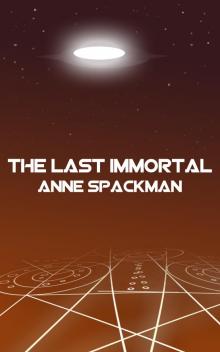 The Last Immortal : Book One of Seeds of a Fallen Empire
The Last Immortal : Book One of Seeds of a Fallen Empire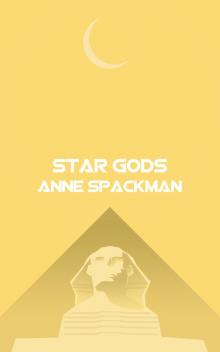 Star Gods: Book Four of Seeds of a Fallen Empire
Star Gods: Book Four of Seeds of a Fallen Empire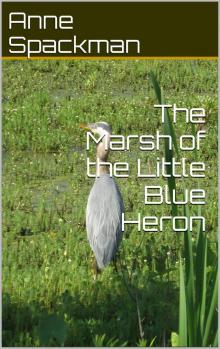 The Marsh of the Little Blue Heron
The Marsh of the Little Blue Heron Cormorant Bay
Cormorant Bay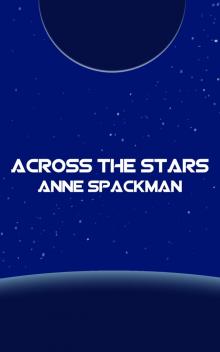 Across the Stars: Book Three of Seeds of a Fallen Empire
Across the Stars: Book Three of Seeds of a Fallen Empire Under the Ash Tree
Under the Ash Tree The Swan Gift
The Swan Gift Kestrel's Eye
Kestrel's Eye Caesar and Cleopatra: A Tale of Julius Caesar
Caesar and Cleopatra: A Tale of Julius Caesar The Road to Skye
The Road to Skye Juniper Hill
Juniper Hill The Empire: Book Six of Seeds of a Fallen Empire
The Empire: Book Six of Seeds of a Fallen Empire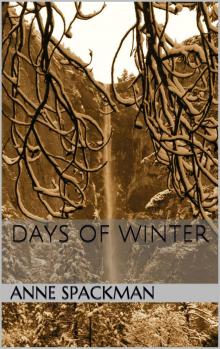 Days of Winter
Days of Winter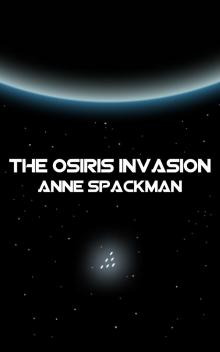 The Osiris Invasion: Book Two of Seeds of a Fallen Empire
The Osiris Invasion: Book Two of Seeds of a Fallen Empire The Comet Riders: Book Five of Seeds of a Fallen Empire
The Comet Riders: Book Five of Seeds of a Fallen Empire Ocean Spirit : The Story of an Undine
Ocean Spirit : The Story of an Undine What Emma Left Behind
What Emma Left Behind The Book of Bird and Fairy Stories
The Book of Bird and Fairy Stories Blackberry Wine
Blackberry Wine Curse of the Dragon Kings
Curse of the Dragon Kings